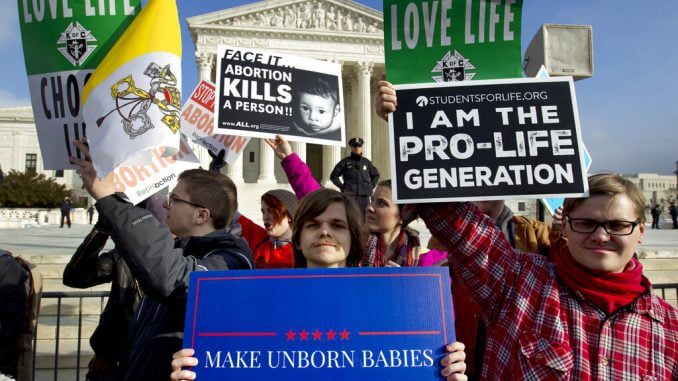
RALEIGH — On April 16, the North Carolina House joined its Senate colleagues, who passed the bill the previous evening, in passing the “Born Alive Abortion Survivors Protection Act.” The legislation, Senate Bill 359, passed by a vote of 65-46 and will now be sent to the governor’s desk for a signature or veto.
Similar bills, which have been taken up across the country in recent weeks, with a federal version stalling in the U.S. Congress, would criminalize neglecting care for infants who survive abortions. The interest in this topic picked up after controversy around a bill in New York that pro-life activists say would not protect infants in these circumstances. A similar bill in Virginia, followed by comments from the state’s governor, only increased the energy around the issue.
Defending the Virginia bill, which eliminated many of the state’s regulations on abortion, Gov. Ralph Northam (D-Virginia), a pediatrician, said on a radio program, “If a mother is in labor, I can tell you exactly what would happen. The infant would be delivered. The infant would be kept comfortable. The infant would be resuscitated if that’s what the mother and the family desired. And then a discussion would ensue between the physicians and the mother.”
In addition to the national conversation, the North Carolina bill was in part motivated by a federal court striking down, in March, the state’s long-standing 20-week abortion ban. The ruling was stayed by the court to give North Carolina a chance to appeal or tweak current laws. Without the law in place, later-term abortions would be legal in the state, and pro-life leaders believe bills like the Born Alive Abortion Survivors Protection Act would be necessary.
“Currently we have a ban on abortions past 20 weeks, but a recent court decision may change that. And we may see more of these born–alive infants,” Sen. Joyce Krawiec (R-Forsyth), lead primary sponsor of the Senate version of the bill, said in floor statements.
Companion bills were filed in both chambers, with Sens. Joyce Krawiec (R-Davie), Ralph Hise (R-Mitchell) and Kathy Harrington (R-Gaston) filing S.B. 359 in the Senate and Reps. Pat McElraft (R-Carteret), Debra Conrad (R-Forsyth), Sarah Stevens (R-Surry) and Pat Hurley (R-Randolph) filing H.B. 602 in the House.
In a statement arguing the need for H.B. 602, McElraft drew attention to the bills in New York and Virginia, calling them “barbaric” and “infanticide.” In Krawiec’s floor statements, she called these bills part of an “extreme agenda” and accused Virginia’s governor of advocating for infanticide.
“This bill does nothing to limit a woman’s access to health care or to come between a woman and her doctor,” Krawiec said. “It’s clear. Allowing a living, breathing child to die without any attempt to provide care is infanticide. Plain and simple.”
Democrats argued that this bill was unnecessary because infanticide is already illegal and late–term abortions are rare. McElraft said during House debate it wasn’t clear how frequently these born-alive situations happen because in all but six states there are no reporting requirements, but she quoted one CDC source that estimated 400-500 cases annually across the country. McElraft was moved to tears recounting her time as a nurse in Jacksonville, seeing a box of fully formed babies that were left from a notorious late-term abortionist’s weekend of work.
“All it is doing is creating unnecessary and scary-sounding criminal penalties and lawsuit threats to our general statutes,” Rep. Susan Fisher (D-Buncombe) said in response during House debate. “The only possible reason I can think of for this bill is to intimidate doctors and health care providers from doing anything in their practices that is anywhere close to legal abortion services.”
Sen. Terry Van Duyn (D-Buncombe), who is also a candidate for lieutenant governor, agreed with Fisher when the Senate debated the bill, saying, “I want to make this abundantly clear. The real reason this bill is being pushed is to stigmatize reproductive health care and to manufacture outrage over something that isn’t happening in order to distract from what actually is. Senate Bill 359 is part of a coordinated, national attempt to ban abortions at every stage, criminalize the doctors who provide this life-saving care and overturn Roe v. Wade. Today, I rise in solidarity with the one-in-four women in this country who will have an abortion at some point in her life.”
Sen. Erica Smith (D-Northampton), who is running to unseat Sen. Thom Tillis in the U.S. Senate, also had strong words in opposition to the bill during debate.
“As I review this bill, I would thank the bill sponsors, if what was alleged to happen in this bill actually occurred,” Smith said. “But it does not. This bill appears to be another extreme anti–women’s health care bill written by legislators and not by doctors.”
In the penalties section of the bill, it states that a health practitioner that does not treat the infant with the same care as one not from a failed abortion, or who doesn’t report someone who violates that rule “is guilty of a Class D felony which shall include a fine of not more than two hundred fifty thousand dollars.”
If the violation passes from passive neglect to an active taking of the child’s life, the penalties are even stronger. “Unlawful Killing of Child Born Alive. – Any person who intentionally performs or attempts to perform an overt act that kills a child born alive shall be punished as under 27 G.S. 14-17(c) for murder.”
After the act passed both chambers, the bill will head to Gov. Roy Cooper’s desk where it is likely to receive a veto. Although Republicans were joined by some Democrats, there likely would not be enough to override the veto.
